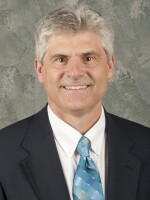Langlade County Health Officer Meghan Williams’ guidance to people in the Northwoods might sound familiar. It is like the guidance you may have heard from many county health officers.
“We are continuing to follow CDC guidelines. So that includes staying at home as much as possible, physical distancing of six feet between people who are not in your household, wearing a mask when in public, washing hands frequently and disinfecting those high touch surfaces,” she says.
Some people in the area are following those guidelines closely. Plenty of other people are not.
Some scholars think those decisions might be tied to the narratives that develop during outbreaks. Duke University professor and author of the book Contagious: Cultures, Carriers, and the Outbreak Narrative Priscilla Wald is an English professor, not a medical doctor or public health scholar. She studies the outbreak narratives that arise with global pandemics. Outbreak narratives are the stories of disease emergence and spread throughout the world, and the social, cultural, and economic contexts in which they occur. There certainly can be a political statement being made by individuals when they do not comply with CDC guidelines, but Dr. Wald believes there is much more to it.
“We are social beings, we have real need for each other, and we have need for contact with each other. Physical contact. Those are all key parts of being human. At the same time, we are always in contact with each other and pose a danger to each other.”
Wald explains some people’s behavior the same way that one might describe a drug addict. We crave something, in this case close human contact, that could kill us and harm others.
“The fact of being human means that we want to make this contact. It also means that we present a danger to each other and it also means we have a responsibility to each other. So there is this sense of American Individualism. There is another strain that has run through America from our founding moments. We have a responsibility to each other. We are a community.”
Wald draws an interesting parallel to Typhoid Mary, who was made infamous as an asymptomatic super-spreader of typhoid fever in New York in the early 1900s. Typhoid Mary, or Mary Mallon, was an Irish immigrant who worked as a cook before it was known how infectious diseases spread. Although she is made out to be the villain because she initially resisted attempts of confinement, Wald gives us a different picture.
“They told her that you could not work as a cook anymore. But they didn’t help her figure out some other way to make her living. And she was starving. The only thing she could do was work as a cook.”
The difference today is we do know how infectious diseases spread.
Wald continues, “we now have the science to know that there is such a thing as an asymptomatic carrier who can transmit the disease. It is well known by people now. The fact that people now are choosing not to care about that is much more selfish than what Mary Mallon was doing.”
Wald sees some similarities between COVID-19 and outbreak narratives of the past, like the disease starting outside the US, like Asia or Africa, and a rush by the scientific and public health officials to contain the spread and find treatments and cures. But she also sees something quite different in the COVID narrative.
“What I think is different than the outbreak narratives I was seeing in the 1990s…is the much broader sense of the problems that have caused it. People are talking about racism. The protests are not separate from the COVID phenomenon, from the pandemic. People are perceiving much more broadly than in the past the way that diseases are unequally suffered by different populations.”
She is not referring to differences in infection rates because of biology, but rather because of the inequities in our social institutions.
“If we go about making the changes that are called for in the protests, beginning with reforming the police and taking care of anti-black violence but also moving into health care, and education, economic equity, and redistribution of resources. Those are the very ways to keep outbreaks from happening or at least keep outbreaks from becoming pandemics.”
Wald believes that long-term solutions may be possible because for the first time the outbreak narrative is being told in this new way.
“If you really want to address the problem long-term, you need to think about changing your everyday practice. That means addressing everything from environmental devastation, development practices to racism. This is what we are seeing with COVID.”





